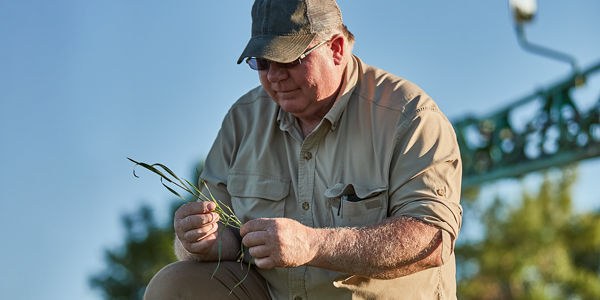Team Up with Your Crop Adviser for Top Cereal Yields
October 26, 2022

Producing top-quality cereal grains is often a team effort, including when it comes to weed control.
A good working relationship with a trusted crop adviser, such as an agronomist or field person from a local retailer, helps ensure that you’re able to identify, treat and control weed pests that otherwise could hurt both crop yield and grain quality, says Monte Anderson, a principal agronomist for Bayer based in eastern Washington.
“Retail crop advisers are really highly valued here … because they are true experts of weed control in our cereals,” he says. “They understand the complexity of the weed spectrum, they know the different products that can be used, and they understand rotational needs of the grower as well as resistance issues.”
Scouting and identifying weeds
Many growers rely on their advisers for field scouting as the first step in knowing what each field needs for weed control.
“The first thing is to identify what you have for weeds,” Anderson says. “It's hilly in the Palouse, and you need to know what your weeds are for the whole field. You need your retailer field person to be able to check out all aspects of the field and make a treatment prescription per field that covers all the different weeds present, whether you're talking the flat, the north side or the south side of the field.”
Regarding winter cereals, Anderson says, “ Sometimes we get some spells during the middle of winter where all the snow is melted, and you can kind of see: ‘There's green winter wheat. Oh, and there's mustards in there. There's henbit up there. I didn't know those weeds were there.’” And for sure as soon as the snow is melted off in early spring, he says, crop advisers should be out with their four-wheelers or ATVs scouting for broadleaf weeds.
Broadleaf weeds are much more difficult to control in winter wheat than in spring cereals, Anderson says, “and those can be many weeds, like mayweed chamomile –probably the toughest one; catchweed bedstraw; prickly lettuce; lots of annual mustards.”
Treatment plans
To control the full spectrum of weed species in a field as well as potentially resistant strains, crop advisers usually will write a prescription made up of more than one herbicide, he says. An agronomist typically is trying to put in enough power to control all the different weeds in a field, because the farmer wants everything to be controlled.
“Huskie® herbicide has become a foundation broadleaf herbicide that has flexibility and can be combined with other products to be the most effectively used and to preserve its utility for the future ,” he says. Especially due to the weed-control challenges in winter cereals in the region, “it's important to have another mode of action or modes of action to help control many broadleaf weeds and to be able to get a higher level of efficacy.”
Huskie has been particularly effective in dealing with ALS-resistant weeds, thanks to the multiple modes of action provided by pyrasulfotole and bromoxynil.
“The weeds that Huskie works best on in the Pacific Northwest in cereals are the mustards,” Anderson says. “People really like the fact that it works quickly on mustards, and it can control a pretty good size mustard plant compared to other herbicides.” In addition to the mustard species, Huskie works very well on prickly lettuce, he says. “And that's something that's difficult to control by other modes of action or in the other crops grown in rotation. So, when Huskie is used in the spring or winter cereal, it's something that can help clean that particular weed up.”
Known or suspected resistance and rotational issues in each field need to be factored in to select the best tank mix partners for Huskie.
Application timing
A perennial challenge in the spring is having the time and equipment to get everything done on schedule, especially when the optimum time to spray weeds conflicts with planting spring cereals, Anderson says. Retail crop advisers can often help supply application equipment along with the prescription and timing recommendations. The latter is usually as soon as ground rigs can run after snow melt.
“It doesn’t take as long to spray a lot of acres these days with new, larger sprayers,” he says, “so growers may be more likely to even stop planting for a few days to get that winter wheat sprayed so that weeds don’t take away from the crop.”
Click the button below to find recommendations, tailored cereal solutions, tools, and learning opportunities to help maximize your fields’ potential.
ALWAYS READ AND FOLLOW PESTICIDE LABEL DIRECTIONS. Performance may vary, from location to location and from year to year, as local growing, soil, and weather conditions may vary. Growers should evaluate data from multiple locations and years whenever possible and should consider the impacts of these conditions on the grower’s fields.
Huskie® Complete is a restricted use pesticide. Not all products are registered for use in all states and may be subject to use restrictions. The distribution, sale, or use of an unregistered pesticide is a violation of federal and/or state law and is strictly prohibited. Check with your local dealer or representative for the product registration status in your state. Huskie® and Roundup® are registered trademarks of Bayer Group. For additional product information call toll-free 1-866-99-BAYER (1-866-992-2937) or visit our website at www.BayerCropScience.us. Bayer CropScience LP, 800 North Lindbergh Boulevard, St. Louis, MO 63167. ©2022 Bayer Group. All rights reserved.
Disclaimer
Always read and follow pesticide label directions, insect resistance management requirements (where applicable), and grain marketing and all other stewardship practices.